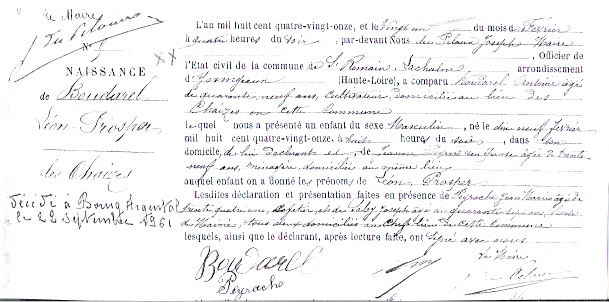French Civil & Parish Records Dictionary
French Genealogy Dictionary: Civil Status and Parish Registers
Understanding the language of French civil and parish records is crucial for successful genealogical research. This comprehensive glossary offers translations of terms. It also provides contextual explanations. These terms are commonly found in French birth, baptism, marriage, death, and burial records. They span from the 16th century to the present day.
Birth and Baptism Terminology (Naissances et Baptêmes)
| French Term | English Translation | Context and Usage |
|---|---|---|
| Acte de naissance | Birth certificate/record | Official civil record of birth, established from 1792 onward |
| Baptême | Baptism | Religious ceremony; primary birth record before civil registration |
| Né(e) | Born | “né” (masculine) or “née” (feminine) |
| Enfant légitime | Legitimate child | Born to married parents |
| Enfant naturel | Illegitimate child | Born outside of marriage |
| Enfant trouvé | Foundling | Abandoned child of unknown parentage |
| Jumeau/Jumelle | Twin | “Jumeau” (male twin), “jumelle” (female twin) |
| Ondoyé | Private baptism | Emergency baptism performed without ceremonies, often when infant’s survival was uncertain |
| Parrain | Godfather | Male baptismal sponsor |
| Marraine | Godmother | Female baptismal sponsor |
| Sage-femme | Midwife | Often named in birth records as the person assisting the delivery |
| Déclarant | Declarant | Person officially reporting the birth to authorities |
| Reconnu(e) | Recognized | When a father legally acknowledges an illegitimate child |
Marriage Terminology (Mariages)
| French Term | English Translation | Context and Usage |
|---|---|---|
| Acte de mariage | Marriage certificate/record | Official civil record of marriage |
| Bans de mariage | Banns of marriage | Public announcement of intended marriage |
| Contrat de mariage | Marriage contract | Notarized agreement establishing property rights between spouses |
| Consentement | Consent | Parental permission, legally required for minors |
| Dispense | Dispensation | Permission to waive certain requirements (often consanguinity) |
| Époux/Mari | Husband/Spouse | Male partner in marriage |
| Épouse/Femme | Wife/Spouse | Female partner in marriage |
| Fiançailles | Engagement | Formal promise to marry |
| Majeur(e) | Of legal age | Legally an adult, able to marry without parental consent |
| Mineur(e) | Minor | Underage, requiring parental consent to marry |
| Noces | Wedding | The marriage celebration |
| Publication | Publication | Public announcement of intended marriage |
| Témoin | Witness | Person attesting to the marriage (usually four witnesses required) |
| Veuf/Veuve | Widower/Widow | Person whose previous spouse has died |
Death and Burial Terminology (Décès et Sépultures)
| French Term | English Translation | Context and Usage |
|---|---|---|
| Acte de décès | Death certificate/record | Official civil record of death |
| Décédé(e) | Deceased | “décédé” (masculine) or “décédée” (feminine) |
| Sépulture | Burial | Religious burial ceremony, recorded in parish registers |
| Inhumation | Interment/Burial | The act of burying someone |
| Mort(e) | Dead | “mort” (masculine) or “morte” (feminine) |
| Mort-né | Stillborn | Child born dead |
| Défunt(e) | Deceased | Often used in formal contexts |
| Lieu de décès | Place of death | Location where the death occurred |
| Cause de décès | Cause of death | May be mentioned in some records, especially after 1800s |
| Témoin de décès | Death witness | Person attesting to the death (usually two required) |
| Faire-part de décès | Death announcement | Formal notification of death sent to family and friends |
| Cimetière | Cemetery | Place of burial |
Standard Phrases in Records (Formulations standard)
| French Phrase | English Translation | Context and Usage |
|---|---|---|
| Par-devant nous | Before us | Typically begins civil records, referring to the official |
| A comparu | Has appeared | Indicates the person who came to make the declaration |
| En présence de | In the presence of | Introduces witnesses |
| Lecture faite | After reading | Indicates the document was read to all parties |
| Ont signé | Have signed | Followed by signatures or marks of those present |
| Ne sachant signer | Unable to sign | Indicates illiteracy when someone could not sign |
| A fait sa marque | Made his/her mark | When an illiterate person made a mark instead of signing |
| Ce jour | This day | Refers to the current date |
| Fils/Fille légitime de | Legitimate son/daughter of | Indicates parents were married |
| De son vivant | During his/her lifetime | Often used when referencing someone deceased |
| Âgé(e) de | Aged | Followed by age (in years, months, sometimes days) |
| Domicilié(e) à | Residing at | Indicates place of residence |
| Profession de | Profession of | Introduces occupation |
Understanding Record Structure
French civil and parish registers follow specific formats that evolved over time. Here are key differences to be aware of:
Parish Records (pre-1792)
- Often written in Latin until around 1700
- Usually chronological but may not be indexed
- Content varies widely depending on priest and period
- May include marginal notes about subsequent life events
Civil Records (post-1792)
- Standardized formats introduced during the French Revolution
- Typically more detailed than parish records
- Usually include signatures or notation of illiteracy
- Follow specific legal requirements for information included
This glossary is part of our comprehensive French Genealogy Dictionary. For terms related to other document types, please visit our main dictionary page.
Last updated: April 14, 2025


